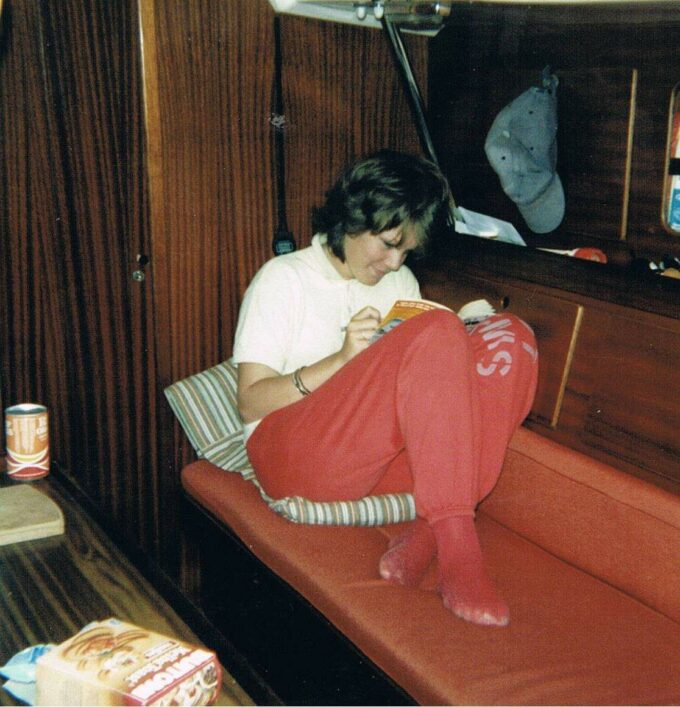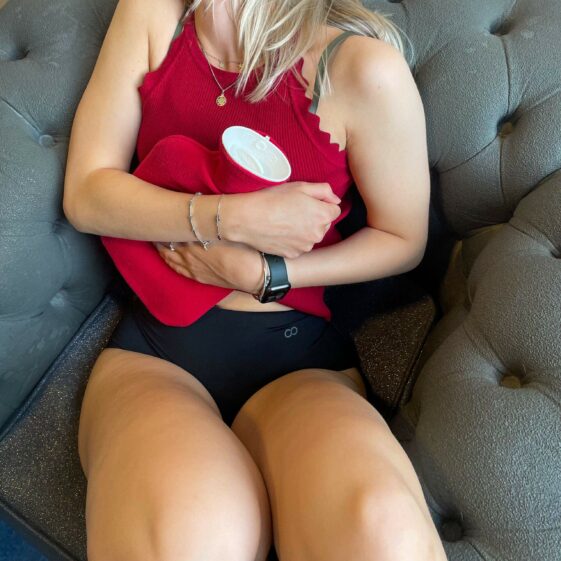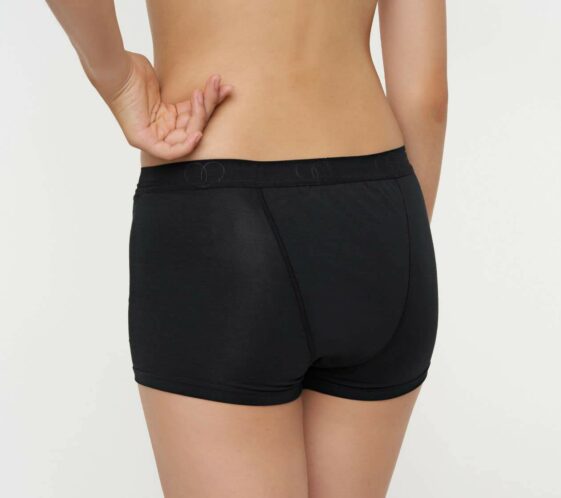We received an email from a mother who hoped that our pants would save her daughter who has heavy menstrual periods and who often had to change her sanitary towels after breakfast because otherwise they would leak.
What an impact such an intensely heavy period must have on the lives of girls and women who have to deal with it every month. 1 in 5 women between the ages of 35 and 55 have to deal with it, which is bad.

What about heavy menstrual bleeding (HMB) in younger ladies between the ages of 11 and 35, I wonder, in the context of the Blood Serious campaign month?
Recent research by WOMEN Inc and Motivaction shows that 77% of women who menstruate suffer from serious complaints. Based on this research, WOMEN Inc presented the Manifesto on menstruation and hormone-related complaints to the Minister (VWS) on September 27, 2022. It turns out that young girls in particular do not go to a doctor with their complaints because they think it is just part of life. Their mother, aunt and grandmother also had it, so it must be part of it. Serious complaints can indicate a condition, but a lot of research still needs to be done. Doctors sometimes don't know what's going on at all, nor that there are many girls who stay home for a few days every month because the heavy bleeding is inconvenient, it exhausts them and they are in pain. The exhaustion is due to anemia due to iron deficiency.

I remembered that I used to have a friend Nathalie who, with a white face and greasy hair, locked herself at home for a few days every month to get through the worst days of her period.
I visited her again and asked Nathalie if she was going to the doctor. No, never been to the doctor. My mother used to have it this bad, so her standard solution was a hot water bottle on your stomach and in bed. 'It will go away by itself'. I often had blisters on my stomach, because only when the hot water bottle was super hot did I feel any pain. If necessary I was given 2 paracetamol, but only in exceptional cases. There was no Feminax back then, which I took when I was older. Took away the worst of the pain, but not all of it. I also went on the pill when I was 18 and that helped too.
“I often had blisters on my stomach, because I only felt any pain when the hot water bottle was super hot.”
When we were young, it was still taboo to talk about these kinds of problems in public and I think that played a role in not going to the doctor. On the other hand, I was raised in such a way that you just had to grit your teeth. As said: 'It will pass by itself'. And it was. After a day the pain was gone. The heavy flows usually only lasted 1-2 days.
I had some questions for Nathalie, my experienced friend.
How seriously did you take your heavy periods as a teenager?
Serious in the sense that I knew it was a sure thing and I had to prepare for it. Every month again. Some months were always worse than others. Back and forth, but all times were terrible. I always thought it was normal. That every woman had her period this way. I didn't know any better.
did you tell teachers or at work what was going on? did you call in sick?
In the past, I have sometimes left school sick if I got my period that day. I just couldn't handle it.
Then of course I signed out, but I can't remember whether I told them what was going on. When I went to work, I rarely called in sick for that reason. Can't remember anyway. But I didn't call in sick easily anyway. I sometimes sat at work sweating and gritting my teeth from the pain. I did tell my closest female colleagues. At least they knew what was going on. At that age, things usually got better in the afternoon, so I could function optimally again.
“Have you received any special or crazy or interesting reactions from people?”
Reactions at home were always neutral. 'Oh, it's that time again. Go to bed, I'll make you a hot water bottle.'
I thought it was fine too. It was the way it was, I thought, so I didn't want to do anything other than lie in my bed. Of course, because I didn't talk about it further, I didn't get any responses.

Only later in life, when I said something about it, did I find out that none of my friends (younger or later in life) suffered from it as much as I did. Reactions from my friends were always sympathetic, but never shocked or anything like that. More along the lines of: 'oh, that seems terrible. Glad I didn't have that.' Which I totally get.
The times I called in sick in high school because I couldn't cope anymore, I had to cycle home for another 45 minutes.
I can still remember that so well. What traumatic memories. I specifically remember one ride where I was wearing white pants. You guessed it: that didn't end well. Big red spot and I didn't even dare to stop at the traffic light because people would see it. At home I crawled into bed crying (with a hot water bottle). The next day I almost didn't dare go to school. What if it happened again? Of course I went and just put on dark pants…
At home I crawled into bed crying (with a hot water bottle). The next day I almost didn't dare go to school. What if it happened again?
I'm impressed, you start having your period somewhere between the ages of 11 and 15 and then immediately feel terribly weak for a few days every month and bleed so heavily that you're afraid to go out because you might leak. I may quote Dr. Heleen van Ommen, pediatric hematologist at the Erasmus MC Sophia Children's Hospital, from an earlier interview she gave.
The main cause
“The main cause of heavy menstrual bleeding in teenagers is so-called anovulatory cycles,” she explains. “This means that vaginal bleeding occurs without ovulation preceding it. During puberty, the hormone balance is not yet completely in order, which means that ovulation often does not occur. As a result, progesterone is not produced and the production of the uterine lining is not stopped. This leads to heavy menstrual bleeding in a quarter of girls. That could take about one or two years.”
This leads to heavy menstrual bleeding in a quarter of girls. That could take about one or two years.
Heleen van Ommen, the pediatric hematologist, emphasizes that it is important to see a GP and ensure that you are taken seriously and referred to the right clinic. This could be a gynecologist, but also a hematologist.
At the Erasmus MC Sophia Children's Hospital, consultation hours are organized twice a month for young women up to 25 years old with heavy menstrual bleeding. You need a referral from your GP for this. Van Ommen: “Then I can check whether there is a clotting disorder, the nurse can diagnose and treat any anemia. And the gynecologist can give pill advice after checking whether there is a gynecological cause.” Blood loss can be reduced by taking the pill, but there are also other options.
In practice, Van Ommen sees that girls or their parents often find it exciting to start taking the pill. “Because people see it more as contraception. You can also start with tranexamic acid alone. That helps enough for some girls.”
What exactly is heavy menstrual bleeding (HMB)?
Heavy blood loss has various causes. The amount of menstrual blood depends, among other things, on the thickness of the built-up endometrium (the inner lining of the uterus).
You can recognize hmb by:
- A shorter cycle (usually around 21 days),
- A longer menstrual period of 7 days or more,
- A lot of blood loss, think of ¾ glass of lemonade or more (instead of 5 tablespoons),
- Loss clots,
- Cramp,
- Fatigue due to iron deficiency.
Heavy menstrual bleeding may be the result of another medical condition. Heavy periods are common with a clotting disorder, but endometriosis, adenomyosis, PCOS and infections, for example, can also cause heavy periods. To rule out (or diagnose) these causes and prevent unnecessary health problems, it is always important to have a medical examination in case of heavy menstruation. The treatment options can then be discussed immediately.
To draw attention to this problem, November has been declared a Blood Serious campaign month. https://www.hevigbloedtrouw.nl/bloedserieus
 Moodies has introduced boyshorts for girls and ladies with heavy periods.
Moodies has introduced boyshorts for girls and ladies with heavy periods.
This has 'super' absorption and can collect between 25 and 30 ml of blood. We realize that this is not an all-day solution for girls and women who have extremely heavy periods, but we hope that we can help more girls and women who have heavy periods with our new boyshorts.
These boyshorts are also wonderful to sleep in, especially because the absorption continues at the back and front.
Sources: Period.nl / Bloedserieus – Heavy blood loss / doq.nl / WomenInc








